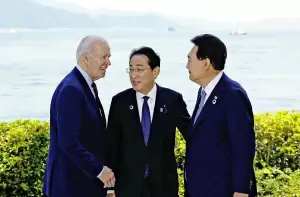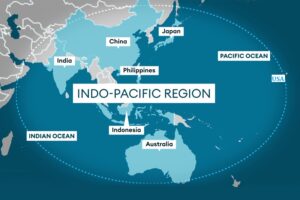Finding Seoul in the Indo-Pacific.
Relevance:
- GS Paper 2: International Relations.
- Tags: #upsc #competitiveexams #indo-pacific #republicofkorea #seoul.
Why in the News?
- The historic Camp David summit in August this year among the leaders of the United States, Japan, and the Republic of Korea (ROK) marks the new beginning of the strategic partnership among the three traditional allies.
- As India and ROK commemorate the 50th year of their diplomatic relations, the Camp David summit, and a refreshingly new strategic thinking in Seoul, offer a unique opportunity for New Delhi to reimagine its relations with South Korea, especially in the Indo-Pacific.
- Along with Japan and the U.S, ROK has the potential to emerge as a key piece in India’s Indo-pacific strategy.
- It is however important to view the prospects of the India-ROK strategic partnership in the broader context of the recent geopolitical developments in the East Asian region.
The significance of the Camp David meet
- This positive bilateral development reflects the changing regional security environment by the three countries. This could lead to a strengthened U.S.-led alliance structure Like QUAD, AUKUS, CHIP-4 in East Asia. This indicates a much-needed repair in Seoul-Tokyo relations.
- The summit has the potential to set South Korea on a new strategic direction in the Indo-Pacific with improved relations with Tokyo, enhanced engagements and countering China in the Indo-pacific region.
- This also marks a strategic shift in Seoul’s traditional approach of not offending China at any cost. The new thinking appears to indicate the view that trade dependence on China does not mean passivity towards a growing Chinese military presence in the region.
- There is today a keen desire in ROK to join the Quad grouping. The Camp David summit may have changed that and it is possible that South Korea might apply for a membership in a Quad Plus next year.
- There is a new foreign policy enthusiasm in Seoul today. President Yoon Suk Yeol has declared that the main goal of his foreign policy would be to make South Korea a “global pivotal state”.
- The country’s engagement of the U.S. and Japan, support to Ukraine, articulation of the China challenge and a desire to play a bigger role in the Indo-Pacific underline this new vision.
- This geopolitical context provides a unique opportunity for India and ROK to enhance their strategic partnership in the 50th year of their diplomatic relationship.
There are a number of reasons why ROK is a natural partner for India in the Indo-Pacific.
- ROK’s location in the Indo-Pacific, close to China, while being a U.S. ally provides India with a like-minded strategic partner.
- For both ROK and India, the rise of China and its unilateral attempts at reordering the Asian security architecture are of great concern even if the two sides hesitate in clearly articulating the China threat.
- For India, Seoul can be an important regional partner at a time when India is closer to the U.S. than ever before in its history, and is concerned about Chinese intentions and power like never before in history.
There are several areas where the two countries could focus on in order to strengthen their relationship.
- At the political and diplomatic levels: Two sides should consider establishing an annual summit at the level of the Foreign Ministers, and a 2+2 format dialogue (India currently has 2+2 dialogues with the U.S., Japan, Australia and Russia).
- Reciprocal Visit by Diplomats: Perhaps the two sides could be even more ambitious and explore the possibility of negotiating a South Korea-Japan-India-U.S. initiative on Critical and Emerging Technology (iCET), along the lines of the recently-concluded India-U.S. iCET.
- Strenthening defense relations: South Korea’s willingness and ability to cater to India’s defence needs within the ambit of India’s ‘Make in India’ programme must be utilised. The K9 Vajra- South Korea’s Hanwha Defense and South Korean-built K2 Black Panther tanks are an example in this regard.
- Collaboration on Korean-built civilian nuclear reactors: Given India’s growing need for clean energy and Seoul’s remarkable track record in supplying cheaper and faster nuclear reactors to the United Arab Emirates, Saudi Arabia, and central European states, New Delhi could consider purchasing Korean-built reactors so as to expand the share of nuclear energy in the country’s energy basket.
Therefore, ROK, with a new strategic outlook, and along with the U.S., Japan and Australia, is uniquely placed to help India advance its interests in the Indo-Pacific.
Source: The Hindu
Mains Question
Discuss the significance of Camp David meet for Indo-Pacific Region. Also analyse its impact for India in countering China in Indo-pacific region.





